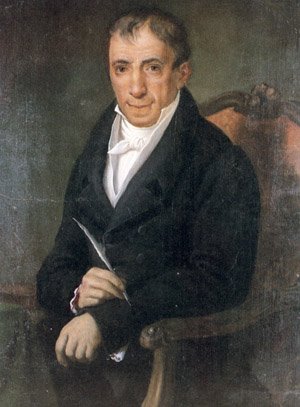<Back to Index>
- Humanist Scholar Adamantios Korais, 1748
- Poet Cecil Day Lewis, 1904
- King of Bavaria Otto, 1848
PAGE SPONSOR

Adamantios Korais or Coraïs (Greek: Αδαμάντιος Κοραής) (27 April 1748 – 6 April 1833) was a humanist scholar credited with laying the foundations of Modern Greek literature and a major figure in the Greek Enlightenment. His activities paved the way for the Greek War of Independence and emergence of a purified form of the Greek language, known as Katharevousa. Encyclopaedia Britannica asserts that "his influence on the modern Greek language and culture has been compared to that of Dante on Italian and Martin Luther on German".
Korais' portrait was depicted on the reverse of the Greek 100 drachmas banknote of 1978 - 2001. Korais was born in Smyrna, in 1748. He was exceptionally passionate about philosophy, literacy and linguistics and studied greatly throughout his youth. He initially studied in his home place, where he graduated from the Evangelical Greek School. As an adult Korais traveled to Paris where he would continue his enthusiasm for knowledge. He translated ancient Greek authors and produced thirty volumes of those translations. Korais graduated from the famous school of medicine of the University of Montpellier in 1788 and was to spend most of his life as an expatriate in Paris. A classical scholar, Korais was repelled by the Byzantine influence in Greek society and was a fierce critic of the ignorance of the clergy and their subservience to the Ottoman Empire, although he conceded it was the Orthodox Church that preserved the national identity of Greeks. While in Paris, he was witness to the French Revolution. He was influenced by the revolutionary and liberal sentiments of his age. He admired Thomas Jefferson; and exchanged political and philosophical thoughts with the American statesman. A typical man of the Enlightenment,
Korais encouraged wealthy Greeks to open new libraries and schools
throughout Greece. Korais believed that education would ensure not only
the achievement of independence but also the establishment of a proper
constitution for the newly liberated Greek state. He envisioned a
democratic Greece, recapturing the glory of the Golden Age of Pericles. Korais
died in Paris aged 84 soon after publishing the first volume of his
autobiography. In 1877, his remains were sent to Greece, to be buried
there. Korais's
most lasting contributions were literary. Those who were instrumental
in publishing, and presenting his work to the public were merchants from Chios.
He felt eternally grateful to these merchants, since without them, it
would have been financially impossible for him to publish his works.
These works included Strabo in Greek, another on Marcus Aurelius, his translation of Herodotus, the translation of the Iliad, and his main literary work, the seventeen volumes of the "Library of Greek Literature". His political writing really begins with the publication at the opening of the nineteenth century of Asma Polemistirion ("War Chant") and Salpisma Polemistirion ("Military Bugal Call"), celebrating the presence of Greek troops fighting alongside the French in Egypt. Earlier he had attacked the Greek Patriarch of Jerusalem for
urging the Sultan's Christian subjects to support him in the war against the 'atheistic' French. Korais went on to publish in 1803 his Report on the Present State of Civilization in Greece,
based on a series of lectures he had given in Paris, extolling the link
between the rise of a new Greek mercantile class and the advance of the
Greek Enlightenment or Diafotismos. In What should we Greeks do in the Present Circumstances?, a work of 1805, he tried to win his compatriots over to Napoleon and
away from the cause of their Russian co-religionists. In later years,
though, his enthusiasm for the French Emperor diminished, and he ended
by referring to him as the 'tyrant of tyrants.' Away from contemporary politics, Korais did much to revive the idea of Greece with the creation of the Hellenic Library, devoted to new editions of some of the classic texts, starting with Homer in
1805. Over the following twenty years many others appeared, with
lengthy prefaces by Korais entitled 'Impromptu Reflections', with his
views on political, educational and linguistic matters. Although the
broad mass of the Greek people was beyond his reach, he played an
important part in the shaping of a new consciousness among the intelligentsia, which was to play a part in the creation of a new national movement.
One
of his greatest accomplishments was the redefining of the Greek
Language. The Greeks were dispersed so widely, from Russia, to Northern Africa, the Middle East, Romania, Italy, and as far as Central Europe,
people who served several masters, had bastardized their language to
the point, where they could not communicate with one another. He
decided to purge the Demotic (the
vernacular or spoken language) of foreign elements. His intent was to
bring the language as close as possible to the classic of Ancient
Greece. This effort ultimately led to his publishing the "Atakta", the first Modern Greek dictionary.